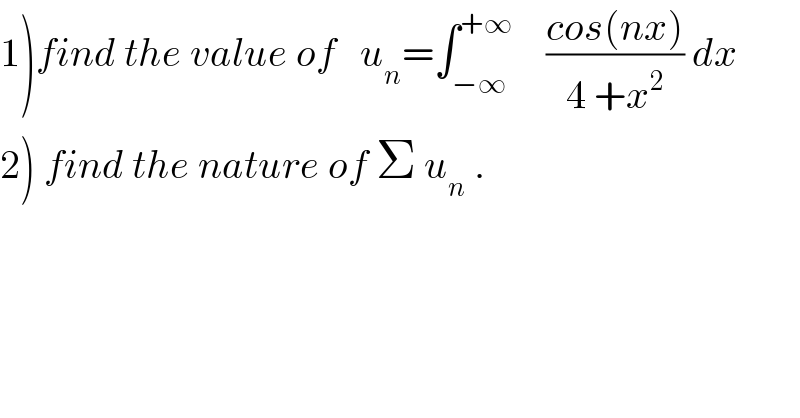Question Number 33129 by prof Abdo imad last updated on 10/Apr/18

$$\left.\mathrm{1}\right){find}\:{the}\:{value}\:{of}\:\:\:{u}_{{n}} =\int_{−\infty} ^{+\infty} \:\:\:\:\frac{{cos}\left({nx}\right)}{\mathrm{4}\:+{x}^{\mathrm{2}} }\:{dx} \\ $$$$\left.\mathrm{2}\right)\:{find}\:{the}\:{nature}\:{of}\:\Sigma\:{u}_{{n}} \:. \\ $$
Commented by prof Abdo imad last updated on 12/Apr/18

$${let}\:{calculate}\:{u}_{{n}} \:{by}\:{redidus}\:{theorem}. \\ $$$${u}_{{n}} =\:{Re}\left(\:\:\int_{−\infty} ^{+\infty} \:\:\:\:\frac{{e}^{{inx}} }{\mathrm{4}+{x}^{\mathrm{2}} }{dx}\right)\:{let}\:{consider} \\ $$$$\varphi\left({z}\right)\:=\:\frac{{e}^{{inz}} }{{z}^{\mathrm{2}} \:+\mathrm{4}}\:.{poles}\:{of}\:\varphi? \\ $$$$\varphi\left({z}\right)\:=\:\frac{{e}^{{inz}} }{\left({z}\:−\mathrm{2}{i}\right)\left({z}+\mathrm{2}{i}\right)}\:\:{so}\:{the}\:{poles}\:{are} \\ $$$$\mathrm{2}{i}\:{and}\:−\mathrm{2}{i}\: \\ $$$$\int_{−\infty} ^{+\infty} \:\:\varphi\left({z}\right){dz}\:=\:\mathrm{2}{i}\pi\:{Res}\left(\varphi,\mathrm{2}{i}\right) \\ $$$$=\:\frac{{e}^{{in}\left(\mathrm{2}{i}\right)} }{\mathrm{4}{i}}\:=\:\frac{{e}^{−\mathrm{2}{n}} }{\mathrm{4}{i}}\:\Rightarrow\:\:\int_{−\infty} ^{+\infty} \:\varphi\left({z}\right){dz}\:=\:\mathrm{2}{i}\pi\:\frac{{e}^{−\mathrm{2}{n}} }{\mathrm{4}{i}} \\ $$$$=\:\frac{\pi}{\mathrm{2}}\:{e}^{−\mathrm{2}{n}} \:\:\Rightarrow\:{u}_{{n}} \:=\:\frac{\pi}{\mathrm{2}}\:{e}^{−\mathrm{2}{n}} \\ $$$$\left.\mathrm{2}\right)\:\:\sum_{{n}=\mathrm{0}} ^{+\infty} \:{u}_{{n}} \:\:\:=\frac{\pi}{\mathrm{2}}\:\sum_{{n}=\mathrm{0}} ^{\infty} \:\:\left({e}^{−\mathrm{2}} \right)^{{n}} \:=\frac{\pi}{\mathrm{2}}\:\frac{\mathrm{1}}{\mathrm{1}−{e}^{−\mathrm{2}} } \\ $$$$=\:\frac{\pi}{\mathrm{2}\left(\:\mathrm{1}\:−\frac{\mathrm{1}}{{e}^{\mathrm{2}} }\right)}\:=\:\frac{\pi\:{e}^{\mathrm{2}} }{\mathrm{2}\left({e}^{\mathrm{2}} \:−\mathrm{1}\right)}\:. \\ $$
Commented by prof Abdo imad last updated on 12/Apr/18

$${remark}\:\:{Im}\left(\:\int_{−\infty} ^{+\infty} \:\:\frac{{e}^{{inx}} }{{x}^{\mathrm{2}} \:+\mathrm{4}}{dx}\right)=\:\int_{−\infty} ^{+\infty} \:\:\frac{{sin}\left({nx}\right)}{{x}^{\mathrm{2}} \:+\mathrm{4}}{dx}=\mathrm{0} \\ $$$${brcausethe}\:{function}\:{is}\:{odd}. \\ $$
